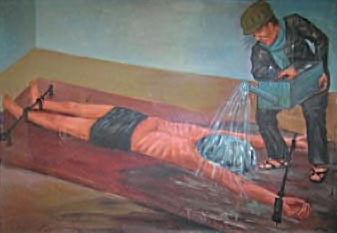
McCain's speech was quickly denounced by Michael Mukasey. Mukasey's said without elaboration that McCain "is simply incorrect", and added that "harsh interrogation techniques were both effective and lawful". Mukasey's sensitivity to the putative legality of forms of torture is not surprising: he was the last attorney general in the George W. Bush administration.
 | |
At the heart of McCain's speech was a plea for the maintenance of moral standards. McCain said: "Ultimately, this is about morality. What is at stake here is the very idea of America — the America whose values have inspired the world and instilled in the hearts of its citizens the certainty that, no matter how hard we fight, no matter how dangerous our adversary, in the course of vanquishing our enemies we do not compromise our deepest values."
Michael Mukasey's parsing of the distinction between "harsh interrogation" and torture or legal and illegal torture is not a discourse one would have found at the senior levels of a Western legislature several years ago. Torture has entered what might be termed the lexicon of allowability ever since 9/11, and it often now appears as a scriptwriter-sanctioned plot device in TV shows like 24.
The above image is taken from the entry for waterboarding at Wikipedia (the painting is by Vann Nath, who was a prisoner at the Tuol Sleng death camp during the Khmer Rouge regime in Cambodia). The entry itself simply refers to waterboarding as torture. The neutrality of the entry has, according to a Wikipedia banner, been disputed. One has to wonder where the disputation comes from.
The idea that democratic countries could engage in the same barbarities as one of the most murderous regimes of the 20th Century does not seem to make sense. It is a sign of how much slippage has occurred in thinking on this subject in the 21st Century; presumably, Michael Mukasey is not defending Khmer techniques, he is defending in his mind lawful and effective ones. Yet there it is -- the torture technique is essentially the same, no matter who practices it. So the questions become: can torture be practiced in a controlled manner that does not erode the essentially decent character of a democratic society? Is torture a stallion that can be ridden?
[to be continued]


No comments:
Post a Comment